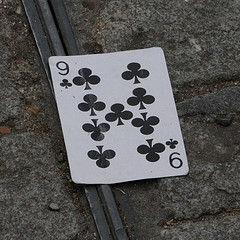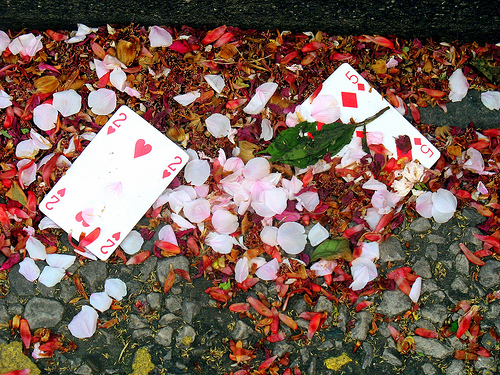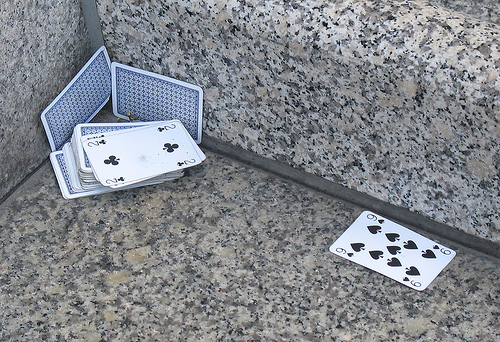By Martha Rosenthal
I should be writing. At least that’s what Hank thinks. Instead, I’m playing computer Solitaire.
Hank’s right. I’ve got that novel in me and there are tons of stories, you don’t know. But, what he doesn’t understand is that playing Solitaire is my way of working up to the writing. I’m priming my brain.
 The beauty to this hi-tech game, and there is a real beauty to it, is that if you get stuck, you can start again, and the computer will lay out the cards exactly the same way. So I really learn each setup inside out. One time it took me forty minutes to win a game. I had to restart fifteen times. Hank thinks this is a waste of time. He doesn’t realize how much persistence it takes. How much strategy. And another thing: when you win a game—or quit, god forbid—the computer tells you how long you’ve been playing and what your winning percentage is. I started with a 29 percent win rate and now I’m up to 34. Hank doesn’t value progress like that.
The beauty to this hi-tech game, and there is a real beauty to it, is that if you get stuck, you can start again, and the computer will lay out the cards exactly the same way. So I really learn each setup inside out. One time it took me forty minutes to win a game. I had to restart fifteen times. Hank thinks this is a waste of time. He doesn’t realize how much persistence it takes. How much strategy. And another thing: when you win a game—or quit, god forbid—the computer tells you how long you’ve been playing and what your winning percentage is. I started with a 29 percent win rate and now I’m up to 34. Hank doesn’t value progress like that.
The funny thing is, I’m a little embarrassed by the time I spend playing Solitaire. Sometimes I slink into the office and play when I don’t think Hank is paying attention to me. I guess you could say it’s like an addiction. I bet if they had an “Are You A Solitaire Addict?” questionnaire in Cosmo, I’d score pretty high.
Yes, I feel guilty, but I’ve got it under control. In fact, my plan is to dump the program when I hit fifty hours of playing time. Right now I’ve played a total of forty hours. Of course, I’m the only one who knows that these forty hours have been logged in two weeks, and I admit I feel a little ashamed about that level of obsession. Especially since Hank is totally supporting me now that I quit my job at the Buzz Diner in order to write.
I’ve always thought I could be a great writer. Maybe it started when I was a kid and my dad, who handed out compliments as rarely as Aunt Marge waxed her mustache, chuckled at one of my stories. So, anyway, this is the year to do or die.
I start at nine every morning. I come into the office and turn on the computer, but, most days, I need to start easy. So, that’s when I open up the Solitaire game. Just as a little warm-up, about ten games. So I play a little and then I write a little, but so far nothing’s turning out quite right. I keep trying, but there’s no fireworks going off. It’s so tedious. Consequently, I play more Solitaire to relieve my stress. Just five games or so in the middle of the day.
And, like I said, I’m really improving at Solitaire.
I like that it’s part chance and part skill. Like, if there’s one red queen and two black jacks, I’ve got to decide which jack to move. If I make the wrong choice, I have to restart the game and play it differently. ‘Course, a game can be a loser no matter how many ways I play it, and I just have to shrug my shoulders and give up.
Maybe I’m a little worried because, lately, if I miss a move, I kind of flinch or grimace at the computer. So far I haven’t done that when Hank is in the room. In fact, it’s a new thing for me to play at all when he’s home. Used to be I’d hold off till after he’d gone to work or to his woodshop.
Hank’s very creative. Loves to make things out of wood and decorate them with junk he finds lying around. Just last week he made this picture frame, but instead of a photo of, say, me, he put this hot water bottle in the middle for a head. The eyes were made out of those aluminum liners that they put inside bottle caps, you know, to keep lunatics from sticking poison in the bottle. And the person’s mouth is a hasp that fell off the tool shed door last spring. See? He doesn’t seem to have any trouble with inspiration or thinking his creations don’t have any fireworks. Maybe that’s why he gives me shit for this Solitaire thing. He just doesn’t understand the difficulty some people have with creativity.
Sometimes I think creativity can only be released when you’re so goddamned bored there’s nothing else to do but invent some kind of fantasy world. That’s why I think I’m getting closer to writing a really powerful story. Solitaire is my brain’s way of staging a last-ditch effort at holding the creative juices in. It’s got to be the most boring thing a person can do. (Although, like I said, I’m discovering a person can experience a true sense of accomplishment from winning a Solitaire game.) But I’m still waiting for my creative dam to burst and all this angst, or whatever, to gush out and form itself into a prize-winning story.
While I’m playing and Hank is in the room, it’s like I can’t really concentrate on the game because I can imagine all the things he’s thinking. He’s not a mean person, and he doesn’t criticize me much. We have an agreement that we try not to interfere with how we each spend our time. Although since he had his bypass surgery, I feel I can say a little something about how much ice cream he’s eating. But when I’m playing Solitaire and he’s in the same room, it’s like I’m having this imaginary conversation.
He always starts it: “Solitaire again?”
“Solitaire helps loosen me up.”
“How tight can you be?”
“You’d be surprised how tight my brain is. I have a very tight brain, and it has to be loosened up very gradually.”
He knows I’m sort of joking, so he laughs and doesn’t say anything for a while, but pretty soon, in my imagination, he can’t help himself. “Maybe writing a little would work better.”
“It might. You’re right. Maybe I’ll try it after I finish this game.”
“Okay,” he says.
He’s an insurance agent, and I imagine him sending emails or updating his files or something. He makes enough money, which is good, seeing as I’m not working right now. I’m real grateful to him for supporting my creative longing like this, but then, in my mind, he always starts up again. “So, finish that game yet?”
“Yes, I finished that game, and I’ve started another one.”
“I thought you said you would try writing after you finished that last game.”
“I’m thinking of a story while I’m playing this game. I’m thinking of a story about a husband who is always telling his wife what she should be doing. So, the wife takes an auto mechanics class at the local high school at night. She learns how to disable a car twenty different ways, and every night when her husband is sleeping she sneaks out to his car and uses one of those twenty ways. So the husband has to take the bus to work for twenty days, and it takes him twice as long to get there and twice as long to get back home, so he’s exhausted all the time and finally loses the energy to pester his wife. See? It’s easy to think of a story while I’m playing Solitaire. Solitaire doesn’t take much brain power.”
“That’s for sure,” he says.
And that ends our imaginary conversation.
I remember a game from a few days ago that was amazing. It started out real slow, barely any moves, but I’d replayed it so many times that I knew it had a mid-life that zoomed. I kept getting closer to winning but not quite. At last I figured out that if I moved the red ten from the stack instead of moving the red ten from the board, it would keep the stack from going dead and would give me the cards I needed to finish off the game.
Man, did that feel good, because I’d figured it out when most people would have given up and dumped the game. Of course, that impresses no one on this whole green earth except me. It’s not the kind of thing you’d want to put on your resume. You might put “good problem solver” or “persistent worker,” but if you get asked in an interview for an example, you better come up with something better than winning computer Solitaire. Eddie at the diner might be impressed, but Eddie isn’t in a position to be hiring people.
Fact is, I miss Eddie and the other regulars. Maybe I should go down and visit, but they all know I quit to write stories and they’ll ask how things are going and it’s hard to explain that I haven’t gotten that burst of inspiration yet.
Benji’ll say, “So, how are those stories coming along? Have you written one about me yet?”
Now, I could lie. I could say, “Yeah, Benji, you are, in fact, the hero in my first story.”
It’d be possible. Benji’s a real heroic-type guy. Once this man came in and ordered coffee. After he drinks it all down, he decides he wants some bacon strips. After he eats all four strips, he wants an egg salad sandwich. After he chomps that down, he wants a plate of onion rings. Then he orders a strawberry milkshake. So, Benji, who was sitting right next to this guy, says, “What else do you want, man? We know there will be something else, so why don’t you order it right now instead of making Jeannie here run back and forth to the kitchen?” And the guy says that, yeah, he was thinking of a piece of cherry pie a-la-mode and he’s sorry, and that’s the last thing he orders.
Well, I thought that was kind of heroic of Benji. Of course, I’d have to change how he looks, make him taller and not as stooped over. Probably I’d change his name to Lance or Trent. I’d have to tell Benji that I changed his name because it would be just like him to glance through the pages looking for his name without reading the story. It might be disappointing for him to see his name is Lance in my story.
“For real, Benji. Lance is you,” I’d say.
“But Lance is tall and has wavy blond hair.”
“Yeah, but he rescues Rosetta from a rogue wave when she’s lost in thought at the beach.”
“How do I know it’s me?”
“Well, for one, he drinks ten cups of coffee a day, just like you. And, if you read the story you’d see that I gave him your generosity, Benji. I made him bighearted, just like you.”
“I was kind of hoping you’d use my real name,” he’d mutter.
“Think of it like you’re disguised, Benji, like a private investigator. I had to disguise you so people wouldn’t be coming in here hounding you to perform all these heroic deeds for them. Some people have a hard time separating fact from fiction.”
“Yeah, I guess. But I might like people coming in here thinking I’m a hero.”
“Christ, Benji! So hire yourself a public relations agent.”
Some people don’t understand fiction. Now, Inalou, she gets it. When I told her I would be writing stories, she says, “If you use me for one of your characters, please have me be about twenty pounds lighter. That’s all I ask.”
“No problem,” I say.
“And red hair, please,” she says.
“Okay.”
“And you can call her Gloria Faye.”
“So, if there’s a slim redhead named Gloria Faye in one of my stories, you’ll know it’s you, right?”
“Right.”
I’d encourage Inalou to write stories, except I don’t need that kind of competition, what with not getting that burst of creativity yet. Maybe when I’ve got ten stories written, I’ll give her a nudge. She’d do real well.
A few months ago she told me about this family that has an Astroturf lawn. I don’t know if it was true or not, coming from Inalou. Anyway, she goes on to say how they water this Astroturf lawn three times a week for twenty minutes each time to make it look authentic. But what’s underneath the Astroturf, I asked her, and that’s where the story got good. She said that the Astroturf covers up a sort of underground mausoleum in honor of all the Jack Russell terriers the family ever had. There’s a trapdoor and you can walk down inside and suddenly you’re in this little room and portraits of these dogs line the walls. Photographs, too, of the dogs holding rats in their mouths. One of them is even holding a badger. A glass case displays ribbons and trophies they all won. And in the center of the room are the dogs themselves, all stuffed in hunting poses, which for a Jack Russell terrier is sort of a low, determined crouch.
Now, I began to think that Inalou made up this whole story, mainly because of the Astroturf. It seems kind of stupid to me to water Astroturf so much. Seems like you’d have a lot of leakage problems. On the other hand, some people don’t plan things out real well, so it could be true. Inalou has a talent like that for stories that make you think.
I’ve got a lot of work to do, either breaking this Solitaire habit or playing ten more hours until I hit my fifty-hour limit. I figure something’s going to give pretty soon. I can feel the pressure building up inside me, although it might just be worrying that Inalou will get the idea to write and then she’ll be the writer and not me. That would make it hard to go back to my job at the diner. I’d kind of shuffle in with my tail between my legs, so to speak.
That’s why I’m thinking I should take Hank’s criticism to heart and knuckle down. But I’ll finish the fifty hours of Solitaire first. What are the chances that Inalou will start writing in the next ten hours?
Art Information
- “Discarded Nine of Clubs” © Leo Reynolds; Creative Commons license
- “Discarded Playing Card, Paul Street, Stratford” “Discarded Playing Cards, Paul Street, Stratford,” and “Discarded Deck of Cards on Bench” © David Jones; Creative Commons license
 Martha Rosenthal recently retired from twenty years as a public school teacher. She has taken creative writing classes through the continuing education program at Stanford University for years and now devotes herself full time to writing. “Solitaire” is her first published story.
Martha Rosenthal recently retired from twenty years as a public school teacher. She has taken creative writing classes through the continuing education program at Stanford University for years and now devotes herself full time to writing. “Solitaire” is her first published story.
She lives in Woodside, California, with her husband and two dogs.



